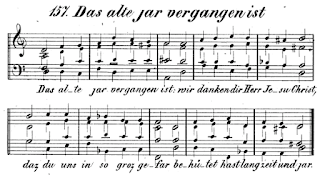Here I repost, in advance of the proper date, my translation of the Christmastide Kyrie trope, “O Vater der Barmherzigkeit,” from a German rendering of the beautiful
Kyrie Magnae Deus Potentiae; here with words by Peter Herbert (
Kirchengeseng 1566; see
Kirch. 1580 p.
150). It should be sung on Sundays of Christmastide.
The 2-phrase version represents the form found in Layriz'
Choralbuch, where it is appointed as an optional Kyrie for Christmas. The original has three stanzas to each Person (per the ninefold Kyrie use accepted in Lutheranism); Layriz' has two, with the 2nd stanza being entirely new, and the whole shorter, including the kyrie addresses, and all in all much more fitting for public worship. In the German below, the original 2nd and 3rd stanzas are labeled "b" and "c" resp., while the newer closing stanzas from Layriz are labeled "b-c.

2-PHRASE VERSION (Layriz):
O FATHER, God of mercies great,
Our hearts to Thee we elevate,
Praying Thee, Thy grace bestow
On rich and poor below.
:: O Father God of matchless might,
We beg Thee to attend our plight:
In Thy mercies inifinite,
Kyrieleison!
CHRIST the Savior of the earth
Thy children save by heav’nly birth,
That they in Thee / May flourish ceaselessly.
:: Hear us, Christ, our Helper sure,
Made man and born of Mary pure,
To be our Cure: / Christe eleison!
O HOLY GHOST, true God, we pray,
Regard Thy people’s needs today;
By Thy grace make bright and fair
The hearts of those who err.
:: O Holy Ghost, grant us the pow’r
To love Thee truly every hour,
And in Thy good virtue flow’r,
Kyrieleison!
Translation © Matthew Carver, 2010.
3-PHRASE VERSION (Boh. Brethren):
O FATHER, God of mercies great,
Our hearts to Thee we elevate,
Praying Thee, Thy grace bestow
On rich and poor below.
:: All those who seek Thee heartily,
Will find such grace and help from Thee,
That they ever may fulfill
Thy gracious, holy will.
:: Give them the truth for which they long,
And pardon for all sin and wrong,
In Thy holy house as one,
Until our life on earth is done.
CHRIST the Savior of the earth
Thy children save by heav’nly birth,
That they in Thee / May flourish ceaselessly.
:: As on earth Thy yoke they bear,
Oh, suffer not the devil’s snare
To cast them down / And steal the victor’s crown.
:: Through the shedding of Thy blood
Assist them here to know Thy good,
And worship Thee / For all eternity.
O HOLY GHOST, true God, we pray,
Regard Thy people’s needs today;
By Thy grace make bright and fair
All the hearts of those who err.
:: O come, Thou promised Comforter,
Thy heav’nly priesthood to confer,
That we may to Thee upraise
Fitting offerings of praise.
:: Oh, let us all by faith be giv’n
The blest inheritance of heav’n,
That we may Thy name adore
With our praises evermore.
Translation © Matthew Carver, 2010.
GERMAN
1a. O Vater der Barmherzigkeit,
wir bitten dich mit Innigkeit
du wollest dich erbarmen
der Schwachen und Armen.
1b. Die sich herzlich zu dir kehren
Gnad und Hilf von dir begehren,
aufdaß sie deinen Willen
stets mögen erfüllen.
1c. Hilf, daß sie die Wahrheit finden,
zur Vergebung aller Sünden,
in heiliger Gemeinschaft-
en denn ihr Bilgerschaft.
[1b-c. O Vater, allmächtiger Gott!
zu dir schreien wir in der Not:
Durch dein groß Barmherzigkeit
erbarm dich über uns!]
2a. Christe, aller Welt Heiland,
hilf allen die dich han erkannt,
daß sie in dir / zunehmen für und für
2b. Laß sie nicht kraftlos werden,
unter deinem Joch auf Erden,
aus deim Gesetz / fallen ins Teufels Netz.
2c. Hilf durch dein Blut vergiessen,
daß sie dein hie wohl geniessen,
und benedeit / dich loben allezeit.
[2b-c. O Christ! wollst uns erhören,
für uns bist du Mensch geboren
von Maria, / erbarm dich über uns!]
3a. O Heiliger Geist, wahrer Gott,
sieh heut an der gläubigen Not
und erleucht durch deine Güt
der irrenden Gemüt.
3b. O komm du verheissner Tröster,
und mach uns geistliche Priester,
daß wir dich unsern Schöpfer,
preisen mit Dankopfer.
3c. O hilf, daß wir durchs Glaubens Kraft,
erlangen die himmlisch Erbschaft,
und deinen edlen Namen.
ewig loben Amen.
[3b-c. O Heilger Geist, wollst uns geben,
dich allzeit– herzlich lieben
und nach deim Willen streben,
erbarm dich über uns.]








